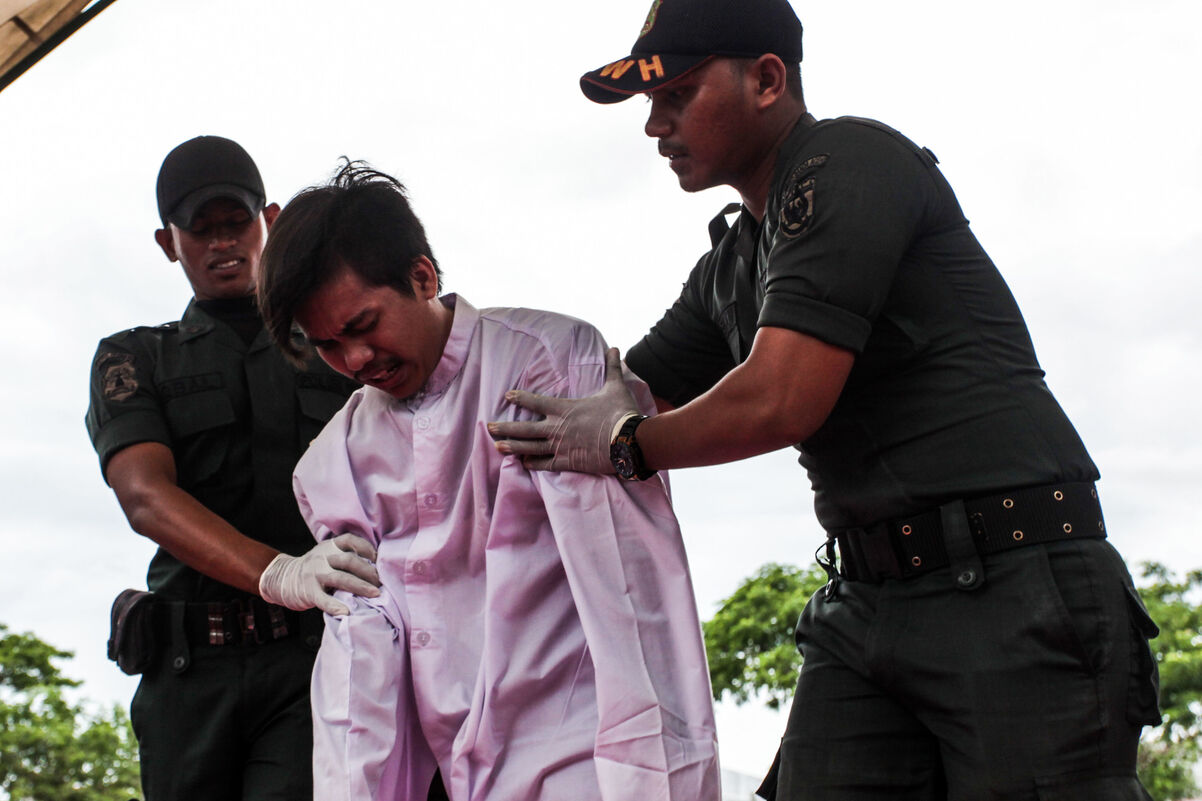Conservative lawmakers in Indonesia are weighing an update the country’s criminal code critics say could enforce harsh punishments on homosexuality.
A proposed bill would amend the Indonesian Criminal Code to outlaw sex outside of marriage, a longtime wish of local Islamist groups. The existing code does not prohibit cohabitation or premarital relations, although adultery is forbidden in some states. The Indonesian Supreme Court rejected a petition to ban relations between unmarried persons in December.
The punishment, if the new code is enacted, would reportedly be up to five years in prison.
Advocates warn the update may adversely affect the LGBTQ community. The Indonesian government does not recognize same-sex unions, meaning that all gay sex is conducted outside of marriage.
Lawmaker Arsul Sani, who co-authored the new criminal code, confirmed in an interview with the Australian Broadcasting Corporation that the policy changes would apply to LGBTQ people. He claimed homosexuality would be “considered the same as adultery, where men and women having sex outside marriage can be considered a crime.”
Sani refers to same-sex relations as “basically a forbidden act.”
Local activist Dede Oetomo claims that under the new criminal code, law enforcement officials would have an unprecedented license to raid the homes of anyone suspected to be LGBTQ or any space where queer and transgender people congregate.
“The police can actually go into any place they think has a ‘sex party’ or an ‘orgy,’ and they have a reason to detain them,” Oetomo tells INTO in an interview.
“If you’re in the wrong room at the wrong time, you might end up in jail,” he adds.
Under Indonesian law, sexual relations are currently legal between consenting adults of the same gender except in four circumstances: 1) the intercourse involves either violence or threats of violence; 2) the encounter is broadcast to the public; 3) it’s sold as pornography; or 4) the interaction takes place in public.
Even under the standing guidelines, police are often known to target queer and trans people under vague claims of violating “morality laws.”
Law enforcement officials accused 58 men arrested in an October 2017 sting on a Jakarta bathhouse of “pornography” and “prostitution.” The detainees, which included several foreign nationals, were charged with up to six years behind bars.
LGBTQ advocates say any action on the part of Indonesia’s government to further stigmatize local queer and trans communities could have grave effects.
“It’s going to fuel the rise of intolerant conservative groups using morality narratives to attack the LGBTQ community, including transgender people,” Amnesty International Indonesia Director Usman Hamid tells INTO. “Conservative politiciansat all levelsmight issue policies or bylaws criminalizing LGBTQ people for being gay, for how they look, and how they love, not committing crimes.”
“It’s going to undermine the state of freedom and democracy in Indonesia,” he continues.
Indonesia’s population likely can’t afford any more discrimination than it already faces. Oetomo cites statistics from Human Rights Watch claiming that more than 400 LGBTQ people have been arrested in the past year and a half as the government, which historically tolerated queer and trans people, has taken a hard turn to the right.
Should the new code be enacted, the advocacy group estimates “millions” risk detention.
“Getting arrested by the Indonesian police is not a pretty sight,” claims Oetomo, who cites widespread reports of police brutality in the Muslim majority nation. “It’s not a good situation.”
Debates over an update to the Indonesian Criminal Code coincide with the arrest of a dozen transgender women in the semi-independent province of Aceh. The women were apprehended over the weekend in a raid on beauty salons, one of the few vocations open to the country’s “waria” population (the local term for trans people).
After cutting off their hair, police forced arrestees into a conversion therapy program intended to teach them “how to behave like men.” Called “Operation Anti Moral Illness,” the lessons include chanting “until their male voices [come] out.”
“We want to change their mentality so they can be better people,” North Aceh Police Chief Ahmad Untung Surianata told media.
More than 200 people were caned in Aceh between the years of 2015 and 2016 under the province’s harsh enforcement of Sharia law. Last year, two men were publicly flogged more than 85 times after locals accused them of engaging in same-sex intercourse. During their punishment, onlookers screamed to beat them harder.
Advocates questioned, however, whether increased punishments against LGBTQ people would be supported by members of the general population.
A recent survey released by the Saiful Mujani Research Centre found that while Indonesians almost universally oppose homosexuality, they are supportive of protections for queer and trans people. Eighty-seven percent of respondents claimed LGBTQ people are a “threat to private or public life,” but a majority felt they should be treated equally under the law.
Oetomo believes the debate over a revised criminal code has only generated increased support vulnerable gender and sexual minorities.
“It has rallied people who were basically humanistspeople who work on HIV, people who are pluralists, people who fight racismthey’re now more vocal in defending sexual rights,” he says, adding with a chuckle: “People tend to accuse me of being too optimistic.”
Hamid, though, argues the new code is “very likely” to passespecially given the upcoming presidential and parliamentary elections in 2019.
The legislature is set to debate the proposal Monday, which is allegedly supported by every single one of Indonesia’s major political parties. If the lawmakers elect to move forward with adopting the revisions, the new language will take time to enact: Legislation has to be introduced in Parliament a year before it can be put into effect.
By that time, the revised Indonesian Criminal Code may not be the only proposal on the table.
There have been early discussions among lawmakers about adopting legislation identical to Russia’s 2013 law forbidding the spread of information on “nontraditional sexual relationships” to minors. The bill would forbid LGBTQ rights advocates, Oetomo claims, from any action viewed as promoting “homosexuality,” “cross-dressing,” or “transgenderism.”
After the bill was unanimously approved in the Russian Duma five years ago, bias attacks against LGBTQ people have nearly doubled. An HIV/AIDS advocate was fined last September under the law for posting links to news articles on Facebook.
“Organizations like mine might be shut down,” says Oetomo, who founded Indonesia’s first LGBTQ advocacy group, GAYa Nusantara.
“It’s still talk at the moment, but we cannot be complacent,” he adds.
Photo credit should read Sijori Images / Barcroft Images / Barcroft Media via Getty Images
Help make sure LGBTQ+ stories are being told...
We can't rely on mainstream media to tell our stories. That's why we don't lock our articles behind a paywall. Will you support our mission with a contribution today?
Cancel anytime · Proudly LGBTQ+ owned and operated
Read More in Culture
The Latest on INTO
Subscribe to get a twice-weekly dose of queer news, updates, and insights from the INTO team.
in Your Inbox














